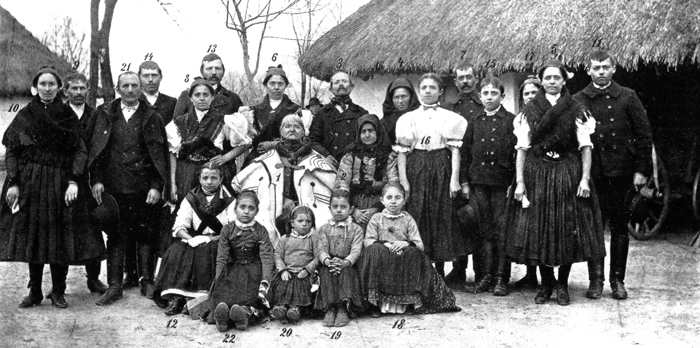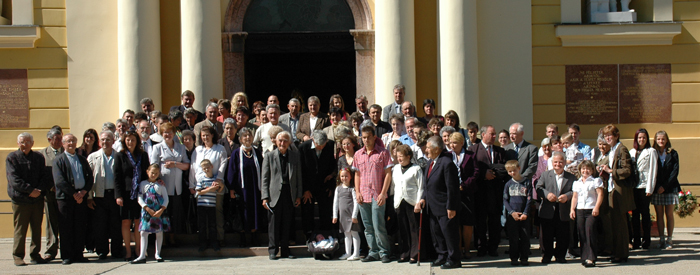Family here does not mean the small household group that is customarily the referent in our time.

Majlát törzs. (Herman Ottó: A magyar nép arcza és jelleme. 1902.)
What is thought of as the family today is no more than a pitiful remnant of a once strong and pervasive kinship community, which counted the unborn and the dead as well as the living, which extended itself into all aspects of individual life — economic, political, legal, cultural, psychological, and biological — and which in political terms was a government itself, monarchy or republic, with no nonsense about equality of membership. Justice, not equality, was the sovereign value of the family.

A Bundula-Csőke család másfél-két évtizeddel kitelepítésük (1950) előtt.
When the word family
was used until a century or so ago, one instantly thought of, not the nuclear or conjugal group, with husband, wife, and immediate children — a group that today in the United States has shrunk to a pathetic 2.78 average size—but the longitudinal family of generations in time, the family of blood line, of tradition and history, of ancestors and planned-for posterity.
Nisbet, Robert, 1982
Zugok és hadak Karcag régi városrészében:
1. Pernyészug, ebben van egy kisebb zug, a Feketezug a Fekete-haddal. 2. Fanzug, ebben van két kisebb zug, a Sereszug és Birizlózug. A Fanzugon a következő családok laknak tömegesen: Tőkés, Sándor, Csőreg; e két utóbbi a Gazdag-utcát lakja. 3. Kisrétoldal, ebben van a Győrffyzug a Győrffy-haddal. 4. Sirályülés, a Szilágyi-haddal. 5. Nagyrétoldal, ebben van a Bundizug és Nadrágzug. A róm. kat. templomtól délre lakik a Tóth-had a következő ágakkal és családokkal: Rác Tóth, Búcsi Tóth, Szentesi Tóth, Boris Tóth, Kis Tóth, Gál Tóth, Szűcs Tóth, jórészt ma is egy bokorban laknak.”
Győrffy István, 1909
Családok, mint törzsek és hadak
egy helyen: ugyanabban a zugban, majorban, tanyán és tanyabokorban mára nemcsak „jórészt” − elvétve sincsenek együtt. Az emlékezet viszont együtt tarthatja a hadakat, időről-időre ugyanazon a helyen, erősítve az összetartozás tudatát.

A Bundula-Csőke család hat évtizeddel kitelepítésük után, 2010-ben. |




